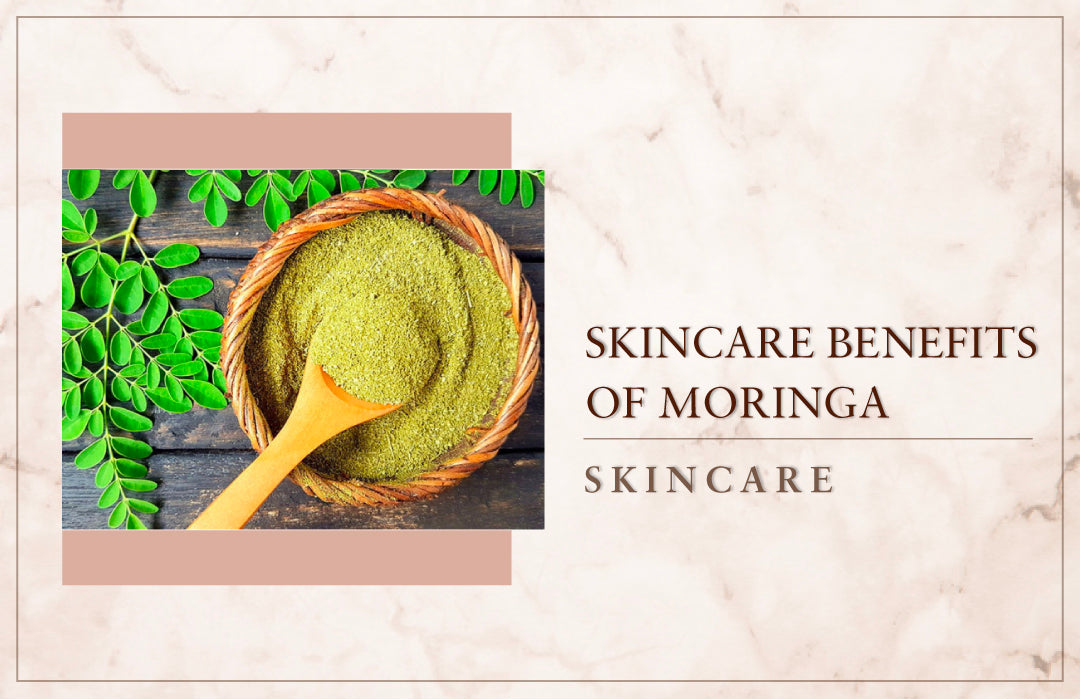From body balms to cleansers and from smoothies to teas, moringa is everywhere. This green has replaced kale and spirulina as the hottest superfood. It might not seem new to us but the humble Moringa or drumstick tree in our backyard has taken global wellness by storm. It contains more Vitamin A than carrots and eggs, more vitamin B12 than steak, more calcium than milk, more iron than spinach, more Vitamin C than oranges, and more potassium than bananas. Moringa has six times the antioxidant content of the popular superfood, goji berries. It contains over 90 nutrients, 46 antioxidants and abundant minerals. It has been used as food and medicine from ancient times in India to combat malnutrition, especially among infants and nursing mothers.

Moringa tree has been referred to as Shobhanjana or very auspicious tree in our Ayurvedic texts. Not without a reason. It is called the miracle tree as all parts of this plant including its bark, roots, leaves, flowers, seeds, sap and pods are a storehouse of nutrients and antioxidants and used in traditional medicine.
Taste (RASA): KATU (Pungent) & TIKTA (Bitter)
Main Quality (GUNA): LAGHU (Light to digest), RUKSHA (Dry), & TIKSHNA (Sharp, strong,)
Potency (VIRYA): USHNA (Hot)
Post digestive effect (VIPAKA): KATU (Pungent)
Therapeutic effect (special potency)
(PRABHAVA): Anti-inflammatory
Effect on Humors (DOSHA KARMA): Pacifies KAPHA & VATA
What are the health benefits of Moringa?
Yakrit Shodhana Liver cleanser
Rakta Shodhana Purifies Blood
Krimighan Removes intestinal worms
Aam Pachak Detoxifier
Hridya Strengthens heart
Medovisha Hara Regulates fat metabolism cholesterol
Chakshushya Improves Eyesight

Moringa provides a rich and rare combination of nutrients with healing attributes. It boosts immunity, lowers blood pressure, fights fatigue and stress and considerably improves the digestive tract.
Dr Neena Chopra, Director of Beauty and Technical, Just Herbs explains, “Moringa is an immense source of good quality protein (consisting of all the essential amino acids), essential fatty acids, vitamins C, E and folic acid and various phytochemicals like flavonoids, phenolics and carotenoids.” Essential fatty acids and essential amino acids are those which are not produced in the body and thus have to be supplied from the diet. “Moringa contains calcium, which is important for bones and teeth and it also contains iron which eliminates anaemia,” adds Dr Chopra.
Thus the rich combination of its nutrients contributes to its antioxidant, anti-inflammatory, anti-cancer, adaptogenic, digestive stimulant, anti-arthritic, anti-stress and anti-ageing properties.

The leaves are nutrient-dense and hence are the most valued part of the tree. These can be consumed fresh but are best absorbed by the body when they are dried and ground to a fine, velvety powder. Dried Moringa leaf powder can also be sprinkled into smoothies, yoghurts, and juices or made into a paste with water and applied topically on the skin.
Why is Moringa good for skin?
Since moringa is highly edible, it is often consumed as part of everyday cooking or powdered and used as a food supplement. When the body’s digestive and excretory system work well, its positive effect can be seen on the skin. The vitamin-rich oil, extracted from moringa seeds, makes for an excellent active ingredient in skin care products. It tackles a variety of skin concerns, ranging from pigmentation and anti-ageing to dullness and dehydration.
Here’s how:
Hydrates dry skin
The presence of high levels of oleic acid in moringa oil helps the skin to retain moisture. Since the oil is light in texture and spreads easily on the skin it is good for therapeutic massage or as a carrier oil for aromatherapy. It provides deep hydration but without a greasy after-feel.
Heals blemishes
Antiseptic and anti-inflammatory properties of moringa seed oil can help to heal minor skin complaints such as cuts, bruises, burns, insect bites, rashes and scrapes quickly.
Slows down Ageing
Being a rich source of essential amino acids, it also helps rebuild the skin’s collagen fibres, which in turn reduces the appearance of fine lines, wrinkles and skin blemishes.

Prevents acne breakouts
Apply a paste of moringa leaves on the acne-prone areas of the face. Its antibacterial action fights acne.
What makes Moringa good for hair?
The high behenic acid content is the reason why the moringa oil is known commercially as “Ben” or “Behen” oil. Behenic acid is known for its conditioning, moisturizing and smoothing effect on hair.
Moringa seeds have a high content of zinc and iron, methionine, cysteine, and arginine amino acids essential for the integrity of the basic structure of the hair fibre and hair growth and thus helpful in the repair of damaged hair.
Methionine which has been shown to reduce hair loss helps to slow down the thinning and greying of hair. Arginine is an important amino acid which helps to produce keratin and also facilitates in supplying blood and nutrients to the hair follicles to promote hair growth. Cystine makes up about one-fourth of the keratin protein and is a crucial amino acid when it comes to hair growth.
How to use Moringa

Moringa leaves can be used in the same way as any other green leafy vegetable such as spinach or methi. The leaves can be added to dals, made into soups or kneaded in the dough to make delicious paranthas.

Dried Moringa leaves can be used as a condiment or herb to add flavour to dishes.

You could make yourself a cup of moringa tea. Take a tsp. of moringa leaf powder and infuse it in a cup of hot water. Whisk for a few seconds to dissolve lumps, if any.

Young, unripe pods, also known as drumsticks are popularly used in sambar in South India.

As for cooking and frying oil, moringa oil is very nutritive and can be substituted for olive oil due to its high oleic acid content.
Will you like to try skincare products with moringa? Here are some of our best sellers which pack in the goodness of Moringa!
Read More:







